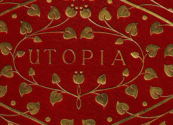Article Analysis
by Brad Young
Wootton, David. “Friendship Portrayed: A New Account of Utopia.” History Workshop Journal 45 (Spring 1998). 29-47.
- I was immediately drawn to Wootton’s article in large part due to the title. It suggested to me that Wootton would argue that Utopia might be read as an attempt to think through what a large scale society of friends might look like.
- Wootton begins with a brief history of the publication of Utopia. He contextualizes it and outlines some of its themes in order to suggest how unique, oftentimes baffling, and incredibly forward-thinking the book was. He sets all this up over the course of three long paragraphs to get to his point, which is to claim that the “real puzzle of Utopia lies… in More’s decision to conceal its original subject, which is friendship” (30). 2 pages are given to the introduction, and just over a page for the conclusion
- Wootton looks in three places to support his claim, which he arrives at through a discussion of Erasmus’ Adages, arguing that Utopia is deeply inflected particularly by the adages about friendship. First, he looks at whether contemporary readers of Utopia would have understood the connection between the Adages and Utopia. Second, that the Adages offer the kind of reading that would lead to Utopia. And third, he tries to prove that More knew this book was about friendship even while not making that explicit. Wootton digs deep and looks at markings made by readers of a 1515 edition of Utopia. Using underlinings and annotations as evidence is interesting, but I find it to be less convincing than using the text in relation other texts as well as the Renaissance humanists’ conceptions of friendship.
- The article is very well written. It moves purposefully from point to point and usually justifies all its claims thoroughly. And all the evidence is clearly connected to the main claim. A few times a claim is stated as evident and yet it’s not made clear why this must be the case. E.g. “Of necessity, one of his concerns was to explore the question of what it meant to lead a Christian way of life without being a Christian” (38). Although it speaks to an interesting question, (why aren’t the Utopians explicitly Christian when they seem to embody certain fundamental Christian practices (e.g. communal life, disinterest in money)?), it’s not clear to me why More necessarily had to present their purported ‘Christianity’ in this oblique way.
- The methodology blends a historical approach with an in-depth literary analysis.
- The article is quite interdisciplinary. History and English are its main fields; however, friendship is certainly also an important concept in philosophy and political theory. The article even touches upon religious studies.
- It draws on a comparative literary analysis of the Adages and Utopia. Wootton does a close reading of the passages of the text that connect with Erasmus’ adages about friendship and also shows how More deals with the aspects of social/national life that would contradict them (e.g. the issues of war and punishment). It also draws on history via an extensive understanding of the practice of friendship among Renaissance humanists as well as knowledge of the biographies of More, Erasmus, and Giles.
- The article positions itself in the so-called Hexter camp, who argue that Utopia is meant to be rooted in ideal Christian and Pythagorean principles. Thus, it is place to learn from and to consider possibly adopting of some of its practices. This is in contrast to those who argue that More’s intention was primarily ironic, and Hythloday should not be trusted.
- I would add that, although this work is greatly appreciated, Wootton writes an article, which I’m glad I didn’t have to. I wouldn’t want to be the one digging through letters, paintings, etc. in order to prove the point. His textual analysis is more along the lines of work I would want to do. What I find most useful about the article is how it clear the way and points out new directions for work to be done on Utopia. Wootton makes possible a different interpretation, and I hope to show why this interpretation is important, useful, and is one reason why the book is highly relevant today.


